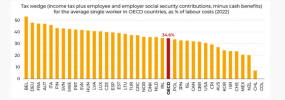
Over one million workers pay top rate of PAYE, not just the high earners
At least 1.1 million people – representing a majority of Ireland’s full-time workers – are hit with the highest, 40pc rate of PAYE, new figures from Revenue show.
The thrust of the media debates in ireland seems to be on spending and welfare increases across the board and not enough attention is being paid to the fact that middle income tax payers in Ireland are paying alot more tax than is fair and compared to our international peers. The fact that the government has not raised the tax bands in line with inflation since the financial crash has meant that more and more workers are now brought into the higher income tax band and this is now over 50% of tax payers. This is extraordinary and unfair and is resulting in people questioning why they are going to work every day when then they are targetted by the green taxes on fuel etc.
The balance has swung too far in Ireland with regard to taxes welfare spending and high spending every where else and not enough attention is being paid to the workers who are keeping this whole system going and are fed up with paying for everything. Whats more extraordinary is that no political party seems to want to represent this electorate the traditional bedrock of society

